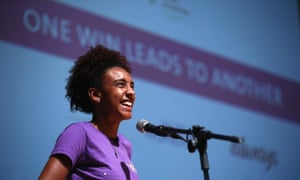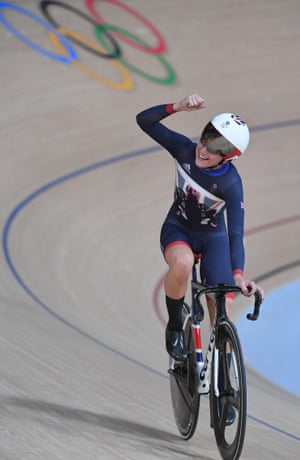“I’d get called a dyke a lot – people would shout it at me all the time and say I was a boy because I got into sport.”
Marcelly Vitória de Mendonça, 16, has spent the morning jostling with 300 or so other schoolgirls who have been invited to the UN’s event on empowering young women at the City of Arts culture complex in Rio de Janeiro.
She seems confident and breezy. “My neighbourhood is dangerous, there are shootings and people selling drugs on street corners.” Our translator nods when I ask her to clarify. “It’s what you expect,” says De Mendonça, “but I’m well known. So when I decided to get serious about handball, people noticed.”
De Mendonça is matter of fact as she lists the friends she has lost to either prostitution or gangs, and the struggle her single mum has had supporting her and her six siblings. “I’m not perfect,” she shrugs, “I made it hard for my mum, I didn’t listen. We argued a lot because I was about that life – you know, drinking, partying and boys,” she rolls her eyes, “but that’s easier, isn’t it?” So what was the turning point? “Three months ago, my coach told me he believed I could be professional. So I could, maybe, one day play handball for Brazil in the Olympics, but that I had to change my attitude. I love playing sport – I’m really good at it – but I wasn’t reliable. I didn’t always commit to the sessions or pay that much attention … He was always on my side, though, and he was never an asshole – so I had to stop being one.”

Studies have consistently proved that girls lose their self-esteem en route to adolescence; research from UN Women claims that at puberty, a girl’s confidence drops at twice the rate of a boy’s and that, at that time, 49% of girls drop out of sports altogether – six times more than the rate of boys. A new Department for Education study of 30,000 pupils finds there is an epidemic of depression among teenage girls, who are more than twice as likely to face anxiety and mental health issues than boys. Keeping young girls playing sport, the experts claim, is one way to counter the crisis.
Maxi-pad maker Always cottoned on to this fact a few years ago for its ad campaign #LikeAGirl, which has now evolved into #KeepPlayingLikeAGirl and is twinned with a UN Women’s initiative, One Win Leads To Another, to keep young girls enthusiastic about physical education and interested in competitive sport. Unsurprisingly, it’s a subject that Laura Trott, Britain’s most successful female Olympian ever, is especially keen on. We speak on the phone, the morning after her magnificent double gold-medal win on the cycling track. “I think a lot of girls get put off sport because it seems hard or they get embarrassed.” Did Trott ever dread the changing-room tension or bunk off PE? “No! I had asthma growing up, but I loved sport. It just happened that I got hooked on cycling after I went with my mum, but I would push so hard for girls to keep going till they find something they enjoy.”
Trott, and the team around her, is keen to position her as both relatable and inspirational to young women. Does she ever feel the burden of responsibility weighing heavily? “I like being a role model,” she says, “it’s why I’m an ambassador for #KeepPlayingLikeAGirl – simple stuff like getting your period and how it affects your performance, but why it shouldn’t put you off … we need to talk about it more in the open. It was amazing when the Chinese swimmer Fu Yuanhui talked about it, every tiny little thing at this level can throw you and have an impact.” Her voice rises and speeds up. “It’s exhausting and I can’t wait to take a break from training. I didn’t take long enough off after the 2012 Olympics and went straight into those six-hour training sessions, but this achievement feels incredible. Of course it’s worth it. We need to keep inspiring young girls to keep going with sport, to give them confidence,” she insists. “That’s the big goal.”

De Mendonça has been trialled through One Win Leads to Another, a $1m (£763,000) Olympiad project in the city adapted from a UN curriculum, designed to embolden and lift Rio’s most underprivileged girls through specialist coaching. The UN women’s committee has rolled out similar efforts in 25 countries and has been working since 2012 with the International Olympic Committee (IOC) to produce a gender equality initiative for Rio and, beyond that, an impact at grassroots level.
How this translates to athletics is something an entire conference of sportswomen, IOC officials and brand partners are keen to impress on me: “Don’t underestimate the power of sport,” Phumzile Mlambo-Ngcuka, executive director of UN Women, tells me. “It can change lives by increasing girls’ beliefs in their own abilities, it encourages them to take initiative and aim high.” What sport does she play? “Oh, this question should be for my granddaughters!” she says, stage-whispering, “I’m a couch potato.”
As it turns out, twice a week, about 500 adolescent girls from the favelas – described as “socially vulnerable contexts” – have been visiting one of the city’s 20 Olympic villas to practise sport and attend gender workshops. The latter offer sexual health lessons, life and financial skills, and an awareness of the girls’ rights and the help available to them as young women. By the end of the year, at least another 2,000 students will be enrolled into the programme. As Mlambo-Ngucka explains it: “A girl who has learned her own strength and resilience on the games field can translate that skill into challenging the obstacles she faces in the outside world.” De Mendonça is blunter: “I don’t care what people say about me. I don’t hang around with bad people any more or waste time with boys like my friends do. I’ve got handball. I’m good at it.”
Trott, 24, says she’s a “girly girl” and wants to show teenagers that it’s not contradictory to get into sweaty physical workouts and still care about appearance. It’s why, she says, she makes an extra effort with her nails and hair when she’s competing. The signature team GB plaits, she says, are about practicality – to keep flyaway hair from her face: “I do the whole team’s hair,” she laughs. “They all come to me to get it done.”
No doubt Trott’s success will inspire a generation of girls to achieve sporting brilliance and level the playing field with their male peers. So does Trott identify as a feminist?
“No, I wouldn’t call myself a feminist,” she tells me. “I mean, I’m about pushing for girls but, no, I wouldn’t say I’m a feminist. It’s a funny word, isn’t it?”



